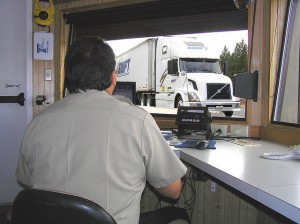Truck Driver’s Guide to Avoiding Overweight Fines
(adsbygoogle = window.adsbygoogle || []).push({});
 When it comes to transportation of goods and materials, one of the biggest worries every truck owner or operator faces is ensuring that the truck is not overloaded. Overweight trucks can incur heavy fines which will negatively impact your bottom line, but they can also create a bad image for your company and affect your reputation in the industry.
When it comes to transportation of goods and materials, one of the biggest worries every truck owner or operator faces is ensuring that the truck is not overloaded. Overweight trucks can incur heavy fines which will negatively impact your bottom line, but they can also create a bad image for your company and affect your reputation in the industry.
You need to put some strict measures in place to avoid overweight truck fines, and ensure that you use a good truck scale to weigh your loads before they are sent out. It’s always easier to prevent a situation than to deal with it after it happens, so make sure your precautions and processes are in place well in advance!
7 Simple Steps to Avoiding Overweight Truck Fines:
Let’s take a detailed look at how you can prevent situations where your trucks are fined for being over weight:
- Ensure that Your Equipment is Well-Maintained – Whether it’s your commercial trucks or the weigh scale you use for weighing loads, keeping every piece of equipment in great shape allows you to prevent errors, accidents and damage. Run routine maintenance and safety checks on every vehicle you use, and get your weighing equipment calibrated by professionals on a regular basis. Your trucks should meet all the current safety, size, weight and any other regulations for the sector.
- Make Sure Your Loads are Secure – Before a truck leaves your premises, the load should be double-checked to ensure that it is evenly distributed and properly secured. The use of tarps, ties and containers can help you prevent cargo from coming loose and causing hazards, as well as the associated fines. While your load may meet the weight limits, it can damage the axles of your vehicle if it gets loose and shifts while your vehicle is on the road.
- Plan the Route Thoroughly – A well-planned route will save you time, money and trouble. When you’re sending a truck out, it helps to know whether you can pick up fuel en route or use truck scales at designated stops, as well as the kind of road conditions you will face and which routes are legal for load transportation. Some operators prefer to use other routes to avoid permanent scales even if it means a longer journey, but this method can be tricky, since officials often carry portable scales for inspections.
- Take Fuel Weight into Account – While it’s a common practice to account for fuel while measuring the weight of the load, we cannot over-emphasize how important this procedure is. If the truck is being sent on a long route, you can calculate how much will be burned off between truck stops, as well as how much you may need to take on in between. A few extra stops for re-fueling with smaller quantities are always better than paying a fine because you had a little extra fuel in it!
- Use On-Board Scales for Extra Security – Truck owners and operators often use on-board weigh scales so that they are not dependent on fixed scales alone. Investing in a secondary set of scales can make a huge difference to the amount of time and effort you spend on weighing loads, as well as help you prevent overweight trucks. Just like a stationary or platform scale, these need to be kept in perfect shape with regular checks, maintenance and calibration.
- Often Overweight? Get a Permit! – Despite all your precautions, you may still find at times that your trucks exceed the weight limits for their route. If there is no way to prevent this, make sure you check about any overweight load permits available in your area. Generally, a gross vehicle load that weighs over 80,000 pounds is considered overweight, but make sure your permit covers the projected loads you might be transporting, as well as any special vehicle size requirements to tackle these loads.
 Create Awareness in Drivers and Operators – When you’re trying to make sure your company follows all the set standards and regulations for truck weight requirements, educate everyone involved in the process. Truck operators should understand how to best distribute loads, communicate properly with authorities and contact relevant personnel in your organization in case of any issues. If a driver feels that his truck load might be over limit, it is essential to keep the shipper in the loop.
Create Awareness in Drivers and Operators – When you’re trying to make sure your company follows all the set standards and regulations for truck weight requirements, educate everyone involved in the process. Truck operators should understand how to best distribute loads, communicate properly with authorities and contact relevant personnel in your organization in case of any issues. If a driver feels that his truck load might be over limit, it is essential to keep the shipper in the loop.
In case you do run into trouble with an overweight truck, it helps to remain calm and act professional.
Being courteous to inspectors and highway officials is essential, since you may find yourself being let off with a warning instead of facing fines and points that will affect your Motor Vehicle Record. While this is not guaranteed to help you prevent penalties, you can be sure that being rude or antagonistic will only cause worse trouble!

It’s interesting to know that when you see those overweight or oversize loads on semi trucks, that there are a lot of different things they need to do to make the trip a success. Something that you said that I think all of these truck drivers need to remember is that they need to remember to get a permit so they can take the load on the route they would like. This seems like a simple step, but I am sure a lot might tend to forget it. This article has great advice for these drivers to make sure that they are able to get their loads to the destination.